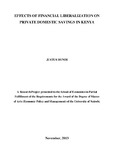Effects of Financial Liberalization on Private Domestic Savings in Kenya
| dc.contributor.author | Bundi, Justus | |
| dc.date.accessioned | 2013-11-27T15:07:57Z | |
| dc.date.available | 2013-11-27T15:07:57Z | |
| dc.date.issued | 2013 | |
| dc.identifier.citation | Degree of Master of Arts (Economic Policy and Management) | en |
| dc.identifier.uri | http://erepository.uonbi.ac.ke:8080/xmlui/handle/123456789/60827 | |
| dc.description.abstract | Kenya has encountered low levels of private domestic savings rate averaging 8% over the past one decade and half. This has happened despite Kenya implementing financial liberalization policies since 1991. This study determines the effects that interest rate liberalization, opening of financial sector to foreign investors and credit control elimination has had on private domestic savings in Kenya using annual time series data for the period 1975-2011. Error correction model (ECM) was utilized to capture the short run dynamics toward the long run equilibrium. The results indicate that interest rate liberalization together with credit control elimination have a negative effect on private domestic saving. Opening of financial sector to foreign investors was found to positively affect private domestic savings. This implies that financial liberalization has worked only through financial intermediation. The results of the study therefore suggest the need to formulate policies to change the negative influence of real deposit interest rate to positive influence and promote financial deepening. | en |
| dc.language.iso | en | en |
| dc.publisher | University of Nairobi, | en |
| dc.title | Effects of Financial Liberalization on Private Domestic Savings in Kenya | en |
| dc.type | Thesis | en |
| local.publisher | School of Economics, | en |

